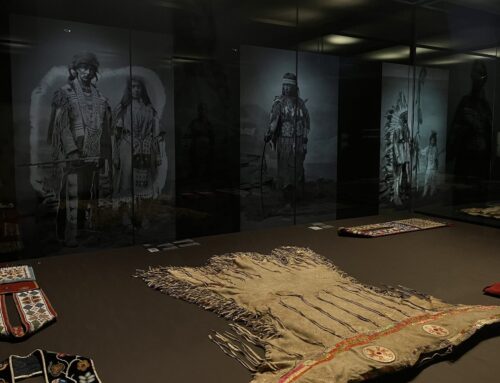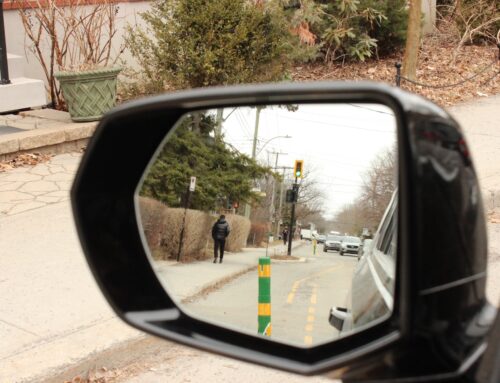BY Lynn Fattal & Jasper Bleho-Levacher
On a cold night of February, like almost every night, EvoluJeunes is organizing recreational sports games in a gymnasium of the secondary school Calixa-Lavallée, in Montreal-North. Tonight, they are playing soccer.
“I come here because they’re like family, and family is important. Plus, I can let off steam, which can be hard to do in the winter,” says Marvens Petit Guy, 22, before the game starts.
Maurice Mbwiti is the recreational intervention assistant at the Henri-Bourassa Pavilion in Montreal-North. He works with children and teenagers.
“From 14, 15-years-old, as teenagers, they are in a phase of self-discovery. They want to assert themselves, seek freedom, and want to explore new things. They don’t want to stay in a formal setting because workshops often remind them of school,” Mbwiti says.
Mbwiti organizes “Espace Ludique”, a place teens can go hang out during their lunch break and after the school day ends, from Monday to Friday.
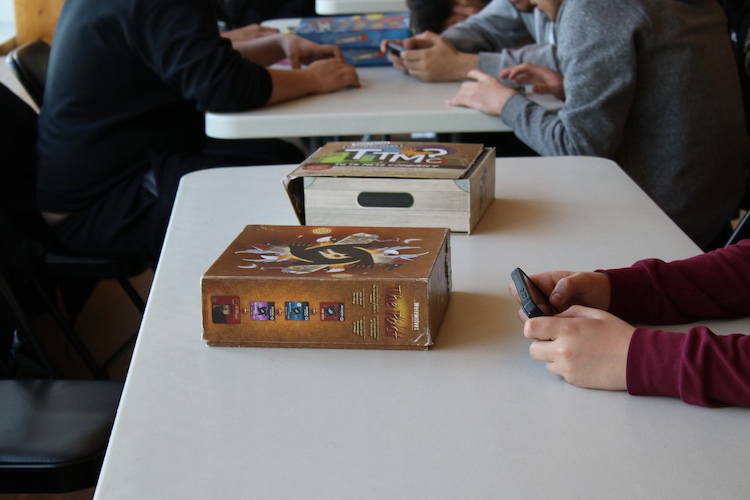
Teenagers have access to diverse board games at the Henri-Bourassa Park Pavilion. Photo by Lynn Fattal.
“It’s very positive because before, when we started, some teens would go to the MCC [the Cultural and Community Center] right next door, but others would hang out in the park, and unfortunately, we would see them in certain spots smoking joints—it may even have been a place for drug dealing and all that,” he says. “There was also solicitation, with people who knew that at those hours, young people would be around, making it easy to lure them in with the promise of quick money. But at least now, some of these young people, as soon as they’re on a break, know they have a place to have fun and stay together.”
The borough of Montreal-North offers well over a hundred free cultural and recreational activities designed for different age groups, ranging from cooking workshops to gardening classes.
For example, Vendredi-Danse is held for 12-to 17-year-olds every Friday in February at the Henri-Bourassa Pavilion, for the occasion of Black History Month with choreographer Anica Félicin. The goal of the activity was to make teenagers discover different African styles of dancing, and to make them move their body during one of the coldest months of the year.

Anica Felicin, choreograph, during the African dance class at the Henri-Bourassa Park Pavilion. Photo by Lynn Fattal.
When it comes to preventing juvenile crime, experts say you need to start early.
“Starting at 12, 13, or 14 years old, young people need community activities, social groups, and competent adults who take an interest in them, spend time with them, support them, and engage in activities together,” says Louis Morissette, an expert in criminality and adolescent psychiatry.
“Community activities have real impact, and should start at the very beginning of adolescence”, Morissette says. “It can be sports, cultural, or social activities—music, theater… any type of activity that brings young people together, gives them a sense of belonging, a goal, a skill, and a sense of pride. That’s what really matters. Interactions with responsible adults and positive role models are also very important.”
EvoluJeunes is a community organization that aims to promote social reintegration and delinquency prevention in Montreal-North to reduce crime and unemployment.
Burak Yilmaz is the president and executive director of Evolu-Jeunes. He says his knowledge of the people of Montreal-North helps him to do his job.
“I build connections with people so they can trust EvoluJeunes or the city more. That way, if they need something, I can help or refer them—whether it’s for legal issues, going back to school, or finding a job. We guide them and direct them to the right place where they can get the help they need,” he says.
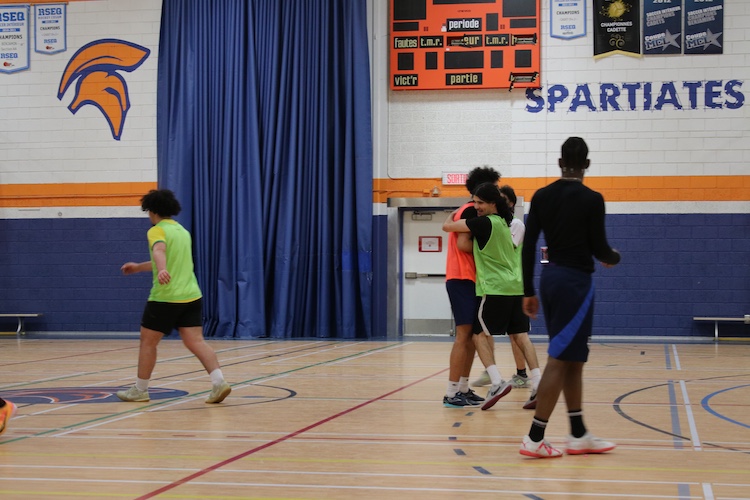
Basketball players with Evolu-Jeunes at the Calixa-Lavallée Secondary School. Photo by Lynn Fattal.
One activity organized by EvoluJeunes and Montreal-North is an opportunity to play basketball at Calixa-Lavallée secondary school. Individuals doing community service are there to supervise the activity, which takes place every day after 7:00 p.m. However, the program is threatened by government cutbacks.
New budget cuts from the provincial government highlight Montreal North’s lack of sports facilities. Video by Jasper Bleho-Levacher.
EvoluJeunes is still looking forward to the results of their efforts.
“On average, the success rate—that is, the percentage of people who find a job and remain stable in it—is around 30 per cent to 40 per cent, depending on the year,” says Yilmaz. “I see the impact. The issue is that many people involved in crime don’t want to go back to regular jobs because earning $2,000 a month doesn’t compare to what they make in a single day. Some listen to our advice, but for others, no matter what we do, it won’t work.”

Evolution of the criminality in Montreal-North compared to the Montreal Island. Infographic by Lynn Fattal.
Yilmaz says that the main challenge for the organization is securing funding. They are entirely funded by grants, but their office space is provided by the borough of Montreal-North.
A common challenge for both community and city actors, apart from funding, is raising awareness of these activities and resources among teenagers, and getting them to actually come to these activities.
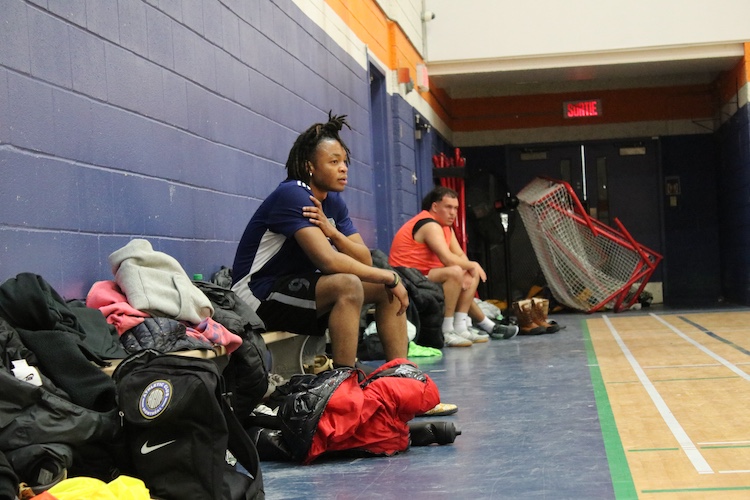
Marvens Petit Guy, 22, is waiting for his turn to play basketball at the Calixa-Lavallée Secondary School. Photo by Lynn Fattal.
“Youth has always been a priority for the borough,” says Marie-Josée Roussy, a community development advisor in the Montreal-Nord borough. “We are always concerned with offering services, whether in social development, culture, sports or recreation, that are accessible and free to the population.”
In 2017, the borough launched the “Priorité Jeunesse” program, running until 2027, to reduce disparities for Montreal-North youth and support their transition to adulthood. It aims to foster independence by providing safe, engaging environments and promoting inclusion, especially for ethnocultural communities and visible minorities.
One of the ways the borough aims to achieve these goals is by providing grants to several community organizations in Montreal-North, such as Evolu-Jeunes, la Clinique Juridique du Grand Montréal, les Fourchettes de l’Espoir, and others. Each of these organizations specializes in addressing specific challenges faced by Montreal-North’s population and works collaboratively with one another and the borough to fulfill these objectives.
As these efforts continue, a key challenge remains: reaching teenagers and getting them involved in the activities designed for them.
“You have to reach them through their interests, you know,” says Mbwiti. “And the truth is, staying focused is much harder today. Keeping a 14- or 15-year-old engaged for an hour—or even 30 minutes—without their phone is a real challenge. It’s one of the new issues we have to deal with.”

